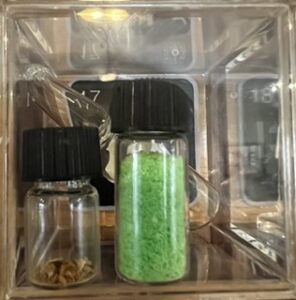Chlorine
Atomic Number: 17
Atomic Mass: 35.453 u

Chlorine, often associated with swimming pools and clean drinking water, is a fascinating and versatile chemical element with a wide array of uses in our modern world. Symbolized as ‘Cl’ and positioned as number 17 on the periodic table, chlorine is more than just a disinfectant; it plays a crucial role in various industries and in our daily lives. This blog post aims to shed light on the multifaceted uses of chlorine and its importance in contemporary applications.
The Basics of Chlorine
Chlorine is a greenish-yellow gas at room temperature and pressure. It’s highly reactive, which means it readily forms compounds with other elements and substances. Interestingly, chlorine gas is poisonous, but when it’s properly diluted and used responsibly, it becomes a powerful tool for a multitude of applications.
Diverse Uses of Chlorine Today
1. Water Purification
- Drinking Water: Chlorine is essential for disinfecting drinking water. It kills harmful bacteria and other microorganisms, making water safe to drink.
- Swimming Pools: It’s also used to maintain the cleanliness of swimming pools, preventing the spread of waterborne diseases.
2. Production of Goods
- PVC Plastic: Chlorine is a key ingredient in the production of polyvinyl chloride (PVC) plastic, which is used in a variety of products including pipes, vinyl flooring, and medical equipment.
- Household Cleaners: Many cleaning products contain chlorine because of its ability to break down and remove stains, grease, and bacteria.
3. Medicine and Pharmaceuticals
- Pharmaceuticals: Chlorine is involved in the synthesis of various pharmaceuticals. It helps in creating medications that treat conditions ranging from allergies to arthritis.
- Medical Supplies: It’s used to make sterile medical supplies, such as blood bag containers and surgical instruments.
4. Agriculture
- Pesticides: Chlorine-based compounds are used in pesticides to protect crops from pests and diseases, playing a critical role in agricultural productivity.
5. Food Industry
- Food Production: Chlorine compounds are used in food processing as disinfectants, helping to maintain hygiene and prevent foodborne illnesses.
Safety and Environmental Considerations
While chlorine is immensely useful, it’s important to handle it with care. Chlorine gas is toxic, and improper handling can lead to hazardous exposure. Environmental concerns also arise, particularly with the production of chlorinated compounds, some of which can be harmful to ecosystems if not managed responsibly.
Conclusion
Chlorine’s role in modern society extends far beyond the swimming pool. Its applications in water treatment, manufacturing, medicine, agriculture, and food processing highlight its versatility and indispensability. As we continue to harness the power of chlorine, emphasis on safe handling and environmental stewardship remains paramount. From ensuring clean drinking water to aiding in healthcare and agriculture, chlorine is indeed a cornerstone element in shaping our world.
Hello, young explorers! Are you ready to dive into the world of chlorine? This element is not just about swimming pools; it’s full of surprises! Let’s check out some fun and fascinating facts about chlorine that you might not know.
- It’s a Cleaning Superhero: Chlorine is famous for keeping swimming pools clean. It’s like a superhero that fights off germs and keeps the water safe for us to swim in!
- Not Just Green and Yellow: Even though chlorine gas is greenish-yellow, when it’s mixed with water, it’s actually colorless and invisible. So, you can’t see it in your swimming pool water!
- Salt’s Best Friend: Did you know that chlorine is found in table salt? Salt is made up of sodium and chlorine. That means you eat a little bit of chlorine every time you sprinkle salt on your food!
- A Space Traveler: Chlorine isn’t just found on Earth; it’s also been discovered in stars and on Mars. Maybe chlorine likes space adventures too!
- Helping Keep Water Clean: Chlorine is super important for keeping drinking water clean. It kills harmful germs in the water, so it’s safe for us to drink.
- It’s All Around Us: Chlorine is used in making lots of things, like paper products, paints, and even some medicines. It’s a real all-rounder!
- A Element with a Past: Chlorine has been around for a long, long time. It was discovered way back in 1774 by a scientist named Carl Wilhelm Scheele.
- Don’t Breathe It In: Chlorine gas is not safe to breathe, so always be careful around it. But don’t worry, in swimming pools and drinking water, it’s perfectly safe because it’s used in very small, controlled amounts.
- A World War I Chemical: Chlorine was used in World War I in gas form. It was not very nice, as it hurt a lot of people. Nowadays, we use chlorine in much safer ways.
- Chilly Chlorine: When chlorine is cooled and turned into a liquid, it’s super cold! It’s used in this form for some scientific experiments.
Isn’t chlorine fascinating? It’s much more than just a chemical for pools; it’s a versatile element that helps us in many ways. Remember, science is all around us, and elements like chlorine make our world an interesting and safer place! 🌟🏊♂️🌍
In the element box, samples of lead chloride, nickel chloride, and chlorine gas.
No media at this time.
 using WordPress and
using WordPress and
No responses yet